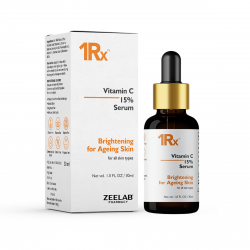Vitamin C Serum for Sensitive Skin


Vitamin C serum for sensitive skin is gaining popularity due to its ability to brighten, hydrate, and protect without irritating delicate skin. However, using the wrong formulation can lead to redness, dryness, or even breakouts. In this blog, we’ll explore how to use Vitamin C serum safely and effectively if you have sensitive skin.
What is Vitamin C Serum and Why is it Used for Sensitive Skin?
Vitamin C serum is a lightweight, water-based product packed with ascorbic acid or its derivatives. It's used to reduce dark spots, boost collagen, and fight free radical damage. For sensitive skin, it offers brightening and anti-aging benefits—but only when used in the right form and concentration.
Is Vitamin C Serum Safe for Sensitive Skin?
Yes, Vitamin C serum is safe for sensitive skin—if you choose a gentle formulation. Look for:
- Lower concentration (5–10%) to avoid irritation
- Buffered or derivative forms like Sodium Ascorbyl Phosphate or Magnesium Ascorbyl Phosphate
- Fragrance-free and alcohol-free base
These features reduce the risk of redness or stinging.
How Should I Use Vitamin C Serum on Sensitive Skin?
Using Vitamin C serum correctly is essential for sensitive skin. Here's a simple guide:
- Patch test on your jawline before full use
- Apply once daily, preferably in the morning
- Use a moisturizer after to lock in hydration
- Always follow with sunscreen
- Introduce it slowly—start with 2–3 times a week and increase frequency if tolerated
What Ingredients Should I Avoid in Vitamin C Serum for Sensitive Skin?
Certain ingredients can trigger sensitivity. Avoid Vitamin C serums that contain:
- Essential oils or synthetic fragrance
- Alcohol or witch hazel
- High L-ascorbic acid concentration (above 15%)
Also, skip harsh actives like retinol or AHAs in the same routine, especially in the beginning.
What Are the Benefits of Vitamin C Serum for Sensitive Skin?
When used correctly, Vitamin C serum offers many skin benefits, even for sensitive types:
- Brightens dull skin and fades pigmentation
- Improves skin texture and tone
- Reduces fine lines and boosts elasticity
- Protects against sun and pollution damage
Its antioxidant action builds skin resilience over time.
Also Read - Vitamin C Tablet for Skin
How to Choose the Right Vitamin C Serum for Sensitive Skin?
Here’s what to look for when selecting a Vitamin C serum for sensitive skin:
- Form of Vitamin C: Go for stable, gentle derivatives
- Concentration: Stick to 5–10% initially
- Formula: Lightweight, non-comedogenic, pH-balanced
- Packaging: Dark bottle to prevent oxidation
Avoid products with too many active ingredients—simplicity is key for sensitive skin.
Frequently Asked Questions
Q. Can I use Vitamin C daily on sensitive skin?
A. Yes, but start slowly—2–3 times a week—and increase frequency if your skin adjusts well.
Q. When should I apply Vitamin C serum?
A. Morning is ideal, followed by sunscreen, to protect skin from sun damage and pollution.
Q. Can Vitamin C cause breakouts?
A. Yes, if too strong. Use low concentration and avoid harsh actives.
Q. Can I use Vitamin C serum with moisturizer?
A. Yes, apply Vitamin C serum first, then layer a gentle, hydrating moisturizer to reduce irritation.
Q. Should I stop using Vitamin C serum if it causes redness?
A. Yes, pause use and consult a dermatologist. You may need a milder formulation.
Conclusion
Vitamin C serum for sensitive skin can be a game-changer—but only with the right approach. Start slow, choose the correct formula, and avoid irritating ingredients. When introduced properly, it helps brighten your complexion, reduce pigmentation, and protect your skin from damage. Always listen to your skin and adjust your routine accordingly for best results.









 Added!
Added!